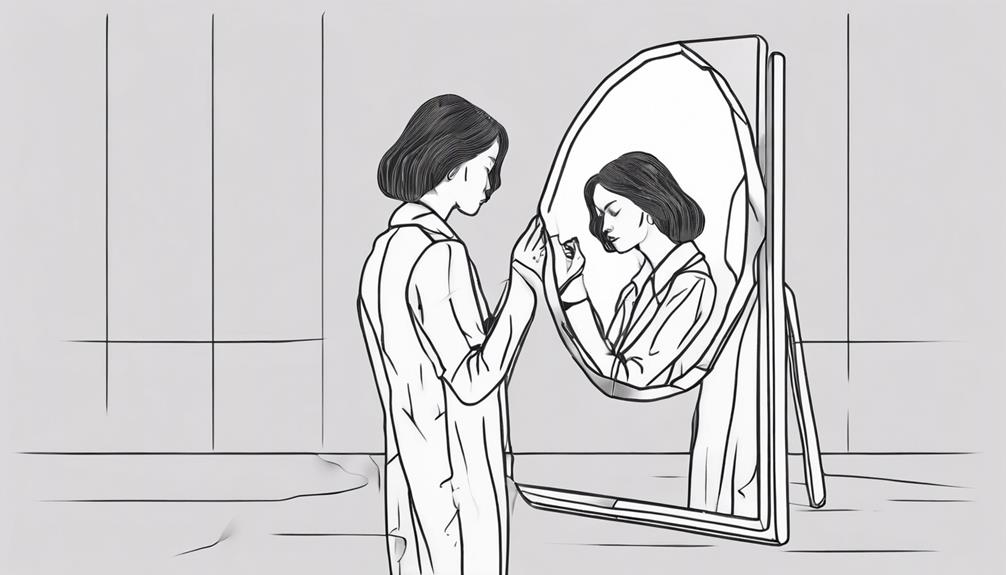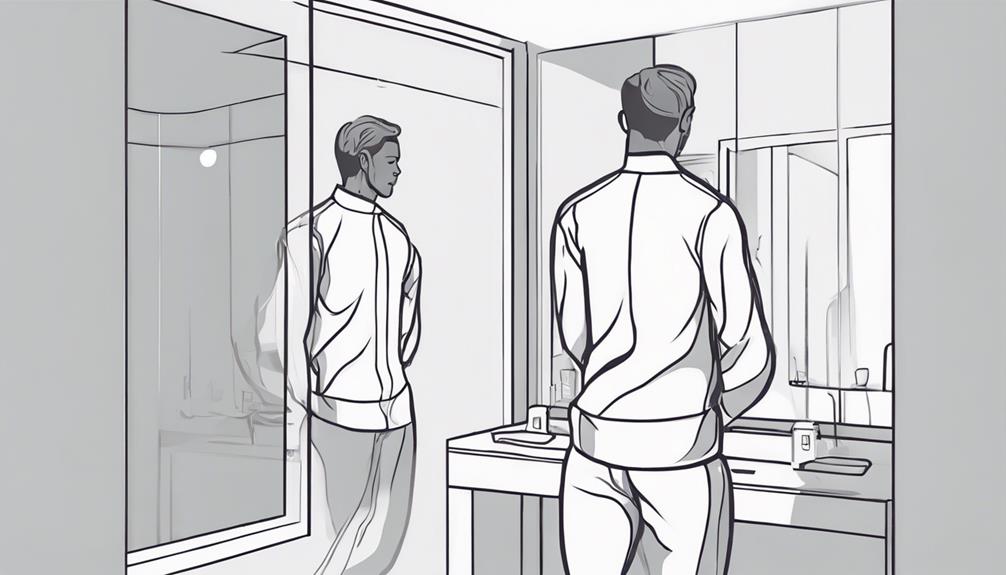Forgiveness stands as a complex yet essential component in the realm of personal growth, often prompting individuals to question the true extent of its impact. Its role transcends mere absolution, intertwining with psychological and emotional well-being in intricate ways that merit closer examination. By delving into the multifaceted implications of forgiveness, one can unravel its profound influence on the journey towards self-discovery and transformation.
Key Takeaways
- Forgiveness is essential for personal growth, releasing negative emotions and fostering inner peace.
- It facilitates healing, empathy, and self-understanding, paving the way for transformative opportunities.
- Embracing forgiveness reduces stress, enhances well-being, and promotes emotional stability.
- Through forgiveness, one can break free from resentment, heal emotional wounds, and achieve inner peace.
Understanding Forgiveness and Healing

Forgiveness, a deliberate act of releasing resentment and anger, plays a crucial role in facilitating emotional healing and personal growth. When individuals choose to forgive, they embark on a journey towards inner peace and self-improvement. By letting go of negative emotions, individuals can experience a sense of liberation from the burdens of past grievances. This process of forgiveness is deeply personal, as it allows individuals to confront their pain, reflect on their experiences, and ultimately heal from emotional wounds.
Through forgiveness, individuals can gain a deeper understanding of themselves and others, fostering empathy and compassion. This understanding is instrumental in promoting personal growth, as it encourages individuals to learn from their past and move forward with a renewed sense of purpose. While forgiveness does not excuse or erase harm, it creates a space for individuals to confront their emotions, cultivate resilience, and embrace opportunities for positive transformation. Ultimately, forgiveness is a powerful tool that empowers individuals to prioritize their well-being and embrace the potential for growth and healing.
The Impact of Forgiveness on Mental Health
Enhancing mental health through the practice of forgiveness involves a profound transformation in emotional well-being and cognitive processes. Forgiveness plays a crucial role in improving mental health by reducing stress, anxiety, and symptoms of depression. It promotes emotional stability, inner peace, and overall well-being. By choosing forgiveness, individuals can strengthen their relationships and foster a positive outlook on life. This act not only releases negative emotions but also promotes empathy and compassion towards oneself and others.
Impact of Forgiveness on Mental Health
| Effects | Benefits | Outcomes |
|---|---|---|
| Reduces stress | Improved emotional well-being | Increased emotional stability |
| Decreases anxiety | Enhanced cognitive processes | Greater inner peace |
| Alleviates depression | Overall improvement in mental health | Strengthened relationships |
Forgiveness, by facilitating the release of pent-up negative emotions, can significantly contribute to an individual's mental health, paving the way for a more positive and resilient mindset.
Forgiveness as a Catalyst for Growth

In the realm of personal development, the pivotal role of forgiveness as a catalyst for growth has been extensively documented and analyzed. Forgiveness plays a crucial role in personal growth by acting as a transformative force that enables individuals to evolve and progress in various aspects of their lives. Here are some key ways in which forgiveness serves as a catalyst for personal growth:
- Emotional Release: Forgiveness helps in releasing negative emotions, paving the way for emotional healing and growth.
- Shift in Perspective: Embracing forgiveness allows individuals to move past painful experiences, leading to a shift in perspective that fosters empathy, compassion, and understanding.
- Opportunities for Growth: By letting go of grudges and resentments, forgiveness creates space for new opportunities and experiences, facilitating personal development.
- Promotion of Resilience: The practice of forgiveness promotes resilience, inner peace, and a positive outlook on life, ultimately enhancing overall personal growth.
Breaking Free From Resentment
Resentment, a common emotional response to feeling wronged or betrayed, can create barriers to personal growth. When individuals hold onto resentment, it can lead to a cycle of negative emotions that inhibit progress and development. Breaking free from resentment through forgiveness is essential for letting go of anger, healing emotional wounds, and cultivating inner peace – all crucial elements for personal growth.
Letting Go of Anger
Letting go of anger through the practice of forgiveness is a transformative process that not only reduces stress and promotes emotional healing but also paves the way for personal growth and development. By releasing resentment and choosing to forgive, individuals can experience a profound shift in their emotional well-being and relationships. Forgiveness allows for mental clarity and inner peace, enabling individuals to focus on the present moment and future opportunities. Breaking free from the grip of anger fosters a healthier mindset and emotional state, leading to enhanced joy and freedom in life. Through the act of forgiveness, individuals can break the chains of negativity and open themselves up to a world of possibilities and growth.
- Reduces stress and promotes emotional healing
- Fosters a healthier mindset and emotional state
- Enables individuals to focus on the present moment and future opportunities
- Leads to enhanced joy and freedom in life
Healing Emotional Wounds
Healing emotional wounds by breaking free from the shackles of resentment is a pivotal step towards fostering personal growth and emotional well-being. Resentment can act as a barrier to inner peace and hinder one's ability to move forward from past grievances. By embracing forgiveness, individuals can release themselves from the burden of negative emotions and begin the process of emotional healing. This transformation not only promotes self-growth but also allows for a healthier mindset and improved overall well-being. To illustrate the impact of this process visually:
| Embrace Forgiveness | Release Negative Emotions | Experience Emotional Healing | Foster Personal Growth |
|---|---|---|---|
| ✓ | ✓ | ✓ | ✓ |
Forgiveness is the key to unlocking the path towards healing emotional wounds and achieving a state of emotional balance.
Cultivating Inner Peace
Breaking free from the chains of negative emotions is essential for fostering a mindset conducive to cultivating inner peace and personal growth. Letting go of resentment plays a pivotal role in this process, allowing individuals to break away from the shackles of bitterness and anger. By releasing the grip of past grievances, one can pave the way for a more peaceful and harmonious inner state. This act of forgiveness not only liberates the individual from the weight of grudges but also provides a fertile ground for emotional healing and growth. In essence, by relinquishing resentment, individuals can embark on a transformative journey towards self-discovery and personal development.
- Release the burden of past hurt
- Create space for inner peace to flourish
- Focus on personal growth without being held back by negative emotions
- Experience emotional healing and liberation
Embracing Forgiveness for Personal Transformation
Embracing forgiveness for personal transformation involves examining the healing power forgiveness offers, the significance of releasing resentment, and the profound growth that follows forgiveness. By understanding the impact forgiveness has on emotional well-being, individuals can navigate towards a more positive and fulfilling life. This exploration of forgiveness as a catalyst for personal growth sets the stage for a deeper understanding of its transformative potential.
Healing Through Forgiveness
In the pursuit of personal growth and transformation, the act of embracing forgiveness emerges as a pivotal catalyst for healing emotional wounds and fostering inner resilience. Forgiveness allows individuals to release pent-up negative emotions, paving the way for inner peace and mental clarity. It promotes emotional well-being by reducing the burden of grudges and resentments. By choosing forgiveness, individuals open themselves up to personal growth, resilience, and heightened self-awareness. Through this process, one can break free from the shackles of the past and step into a future filled with possibilities and positivity.
- Release pent-up negative emotions
- Foster inner peace and mental clarity
- Reduce the burden of grudges and resentments
- Open the door to personal growth and resilience
Letting Go of Resentment
Forgiveness, particularly in the context of letting go of resentment, plays a crucial role in facilitating personal transformation by freeing individuals from the emotional burdens of past grievances. By embracing forgiveness, individuals release negative emotions that weigh them down, leading to a sense of inner peace and well-being. Letting go of resentment enables individuals to break free from the cycle of holding onto grudges and allows them to move forward from past hurts. This release creates space for self-discovery and personal development, fostering resilience and empathy. Choosing forgiveness as a path to personal growth not only cultivates a deeper understanding of oneself and others but also paves the way for positive experiences and relationships to flourish in one's life.
Growth After Forgiveness
The process of integrating forgiveness into one's personal journey towards transformation involves a profound shift in mindset and emotional processing. Embracing forgiveness allows individuals to let go of past hurts and resentment, paving the way for personal growth. Growth after forgiveness can manifest in various ways:
- Emotional healing and resilience are promoted, aiding in overcoming obstacles.
- Inner peace, freedom, and closure are experienced.
- New opportunities and positive relationships are welcomed.
- Self-discovery, self-improvement, and a more fulfilling life journey are catalyzed.
Choosing to forgive not only fosters personal transformation but also enables individuals to embrace a brighter future by releasing the weight of resentment.
The Connection Between Forgiveness and Emotional Well-being
Forgiveness plays a pivotal role in shaping one's emotional well-being, influencing stress levels and overall mental stability. By letting go of resentment and anger, individuals can experience a significant improvement in their emotional health. Studies have shown that embracing forgiveness leads to reduced stress and anxiety levels, allowing for a sense of closure on past grievances. This closure is vital in promoting mental and emotional stability, as it frees individuals from the burden of carrying grudges or negative emotions.
Moreover, forgiveness enables individuals to shift their focus from dwelling on past hurts to concentrating on personal growth and future aspirations. By choosing forgiveness, individuals can embark on a journey towards healing from emotional wounds, fostering a sense of inner peace and tranquility. This process not only benefits the individual's emotional well-being but also paves the way for enhanced compassion and empathy towards others. Ultimately, the connection between forgiveness and emotional well-being highlights the transformative power of letting go and moving forward towards a more balanced and fulfilling life.
Overcoming Past Hurts Through Forgiveness

Forgiveness serves as a mechanism for individuals to confront and transcend past hurts, enabling them to unburden themselves from the weight of negative emotions. By choosing to forgive, one can relinquish feelings of resentment, anger, and pain tied to previous experiences, paving the way for emotional healing and personal growth. This process empowers individuals to embark on a journey of self-discovery and resilience, allowing them to embrace new opportunities and shape a more positive future.
Healing Through Forgiveness
Amidst the journey of personal growth, navigating past hurts and emotional wounds inevitably leads individuals to a pivotal crossroad marked by the transformative power of forgiveness. Healing through forgiveness is a profound process that enables individuals to overcome past hurts and emerge stronger. Here are some key aspects of healing through forgiveness:
- Release of Emotional Baggage: Forgiveness allows individuals to let go of the weight of past grievances, freeing them from emotional burdens.
- Renewed Inner Peace: Through forgiveness, individuals find inner peace and tranquility, replacing turmoil with serenity.
- Empowerment and Resilience: Forgiveness empowers individuals to break free from negative emotions, fostering emotional resilience and strength.
- Transformation and Growth: Choosing forgiveness transforms pain into opportunities for growth, paving the way for a brighter, more fulfilling future.
Releasing Emotional Burdens
Navigating the journey of personal growth often involves confronting and overcoming past hurts and emotional wounds, a process that can be facilitated by releasing emotional burdens through the practice of forgiveness. Letting go of grudges allows individuals to break free from the chains of resentment and anger, enabling them to move forward unencumbered by negative emotions. This act of forgiveness is a powerful tool for emotional healing and personal growth, as it shifts the focus from past grievances to present opportunities. By releasing these emotional burdens, individuals create space for positivity and growth in their lives. The table below illustrates the transformative effects of letting go of grudges through forgiveness.
| Benefits of Letting Go of Grudges Through Forgiveness |
|---|
| 1. Emotional Healing |
| 2. Personal Growth |
| 3. Positive Outlook |
Empowering Self-Growth Journey
Confronting and resolving past emotional wounds plays a crucial role in fostering personal growth and empowerment on the journey toward self-discovery and development. Overcoming past hurts through forgiveness is a transformative process that leads to emotional healing and sets the stage for profound personal growth. Self-forgiveness, a vital component of this journey, involves letting go of self-blame and guilt, paving the way for inner peace and self-empowerment. Additionally, forgiving others for past wrongs not only cultivates new perspectives but also catalyzes positive changes in one's life. Embracing forgiveness as a tool for personal development allows individuals to move forward with a lighter heart and a clearer mind, ultimately fostering inner peace and facilitating a more enriching self-growth journey.
Forgiveness: A Path to Inner Peace

Forgiveness serves as a transformative pathway towards inner peace, allowing individuals to shed emotional burdens and cultivate a mindset conducive to personal growth. By letting go of grudges and releasing the weight of past grievances, individuals create space for healing and emotional resilience. This process enables individuals to move beyond the negative emotions that often accompany holding onto resentments, such as anger and bitterness.
Through forgiveness, individuals can embrace self-reflection, empathy, and understanding toward themselves and others. This shift in perspective not only fosters a sense of inner peace but also promotes mental well-being. By choosing to forgive, individuals open themselves up to the possibility of healing past wounds and developing a more positive outlook on life. This liberation from resentment and anger can lead to a profound sense of empowerment, allowing individuals to navigate life's challenges with greater ease and grace. Ultimately, forgiveness paves the way for personal growth and a deeper sense of inner peace.
Letting Go Through Forgiveness
Embracing the practice of forgiveness entails a profound act of liberation from emotional burdens, setting the stage for personal growth and inner healing. Letting go through forgiveness is a transformative process that allows individuals to shed the weight of grudges and resentments, paving the way for a brighter future. Here are some key aspects of letting go through forgiveness:
- Releasing Resentment: Forgiveness involves releasing feelings of resentment towards those who have wronged us, freeing up mental and emotional space.
- Embracing Healing: By letting go of grudges, individuals open themselves up to healing and inner peace, fostering a sense of well-being.
- Breaking Free: Forgiveness empowers individuals to break free from the chains of negative emotions, enabling personal growth and development.
- Inviting Positivity: Letting go through forgiveness invites positivity and optimism into one's life, creating room for new opportunities and growth.
Through the act of forgiveness, individuals can embark on a journey of self-discovery and empowerment, leaving behind the shackles of the past and stepping into a brighter tomorrow.
The Liberating Power of Forgiveness

Forgiveness holds a profound power that transcends the shackles of resentment and bitterness, offering individuals a pathway to emotional liberation. By embracing forgiveness, individuals can break free from the constraints of past grievances, paving the way for personal growth and self-improvement. This transformative act not only fosters healing but also cultivates inner peace, enabling individuals to navigate life with a renewed sense of clarity and purpose.
Emotional Healing Through Forgiveness
In the realm of emotional healing, the liberation experienced through the act of forgiving is a profound catalyst for personal growth and inner peace. Forgiveness liberates individuals from emotional pain and suffering, allowing for the healing of deep-seated wounds. It empowers individuals to let go of past grievances and move forward, fostering emotional resilience and promoting personal growth. Embracing forgiveness not only paves the way for positive transformation but also enhances emotional well-being. Through forgiveness, individuals can release themselves from the burdens of resentment, anger, and hurt, creating space for healing and growth to take root within their hearts and minds.
Growth After Forgiveness
The transformative impact of embracing and internalizing forgiveness on personal growth is a subject of profound significance in the realm of emotional healing and resilience. By letting go of grudges, individuals free themselves from emotional burdens, paving the way for self-discovery and healing. This liberation from past grievances creates space for new opportunities and a deeper understanding of oneself. Forgiveness empowers individuals to break away from the chains of resentment, leading them towards a path of clarity, purpose, and growth. It is through this transformative process that resilience is nurtured, fostering a positive outlook on the future. Embracing forgiveness not only liberates individuals from the weight of the past but also catalyzes their journey towards personal development and fulfillment.
Forgiveness: A Journey to Self-Discovery
Exploring the process of self-discovery through the lens of forgiveness reveals the intricate interplay between personal growth and emotional liberation. Forgiveness is not merely about letting go of grudges; it is a profound journey that can lead to transformative self-discovery.
- Forgiveness allows individuals to release past hurts and move forward in their personal growth journey.
- It fosters self-discovery by helping individuals understand their emotions, perspectives, and values.
- Through forgiveness, individuals can let go of negative emotions that may be blocking their personal development.
- Forgiveness enables individuals to cultivate self-awareness and learn from their experiences for growth.
This journey of forgiveness involves deep introspection, reflective practices, and the acceptance of one's vulnerabilities. By embarking on this journey, individuals can peel back the layers of their emotions, confront their innermost thoughts, and ultimately uncover new aspects of themselves that contribute to personal growth and development.
Forgiveness and Emotional Release

Through the lens of forgiveness and emotional release, individuals can confront their innermost feelings and achieve a sense of liberation from past grievances. Letting go of pent-up emotions and negative energy is a pivotal aspect of this process. By embracing forgiveness, individuals can unburden themselves from the weight of holding onto grudges and resentment, allowing for emotional healing to take place. This act of letting go not only promotes inner peace but also serves as a catalyst for personal growth and transformation.
When individuals choose to forgive, they actively engage in a process that enables them to release the emotional turmoil that has been festering within them. This release is not merely a symbolic gesture but a profound internal shift that can lead to a newfound sense of freedom and closure. By acknowledging their emotions, accepting them, and then choosing to forgive, individuals open themselves up to a journey of emotional release that ultimately empowers them to move forward with a lighter heart and a clearer mind.
Cultivating Forgiveness for Personal Empowerment
Understanding the significance of cultivating forgiveness is essential for unlocking personal empowerment and growth. Forgiveness is not just about excusing others; it is a powerful tool for self-empowerment. By letting go of grudges and resentments, individuals can free themselves from the weight of negative emotions and open up space for personal development. Here are key aspects of cultivating forgiveness for personal empowerment:
- Self-Awareness: Forgiveness requires introspection and understanding of one's emotions and triggers.
- Emotional Healing: Letting go of past hurts allows for emotional wounds to heal and promotes psychological well-being.
- Release of Negative Emotions: Forgiveness enables individuals to release anger, bitterness, and sadness, leading to a sense of inner peace.
- Promotion of Inner Peace: Embracing forgiveness paves the way for tranquility, acceptance, and a positive outlook on life.
In essence, cultivating forgiveness is a transformative process that can empower individuals to overcome challenges, grow from past experiences, and lead a more fulfilling life journey.
The Role of Forgiveness in Self-Healing

Forgiveness plays a pivotal role in the process of self-healing, facilitating the release of emotional wounds and fostering a path towards personal well-being. Letting go of grudges is a fundamental aspect of this process, allowing individuals to free themselves from the weight of past grievances. By forgiving, individuals can release negative emotions, such as anger and resentment, which may be hindering their ability to heal. This act of forgiveness enables a shift towards a more positive mental and emotional state, crucial for overall well-being. When individuals choose to forgive, they create space for healing to take place, closing emotional wounds and paving the way for personal growth. The practice of forgiveness not only promotes inner peace but also cultivates resilience and a healthier mindset, essential components for self-healing and long-term well-being. Embracing forgiveness is a powerful tool in the journey towards healing and personal growth.
Forgiveness: A Bridge to Personal Growth
Forging a pathway towards personal growth, the act of forgiveness serves as a transformative bridge connecting individuals to inner peace and emotional resilience. Forgiveness enables individuals to let go of past grievances and emotional burdens, creating space for growth and self-improvement. Through forgiveness, individuals can cultivate a positive mindset that allows for learning from past experiences and embracing personal development. Choosing to forgive promotes self-awareness and emotional resilience, essential qualities for navigating challenges and fostering growth effectively.
- Release Emotional Baggage: Forgiveness allows individuals to release pent-up emotions and negative energy, clearing the path for personal growth.
- Inner Peace and Healing: By forgiving, individuals can experience inner peace and emotional healing, creating a foundation for personal development.
- Positive Mindset Cultivation: Choosing forgiveness fosters a positive mindset, enabling individuals to let go of the past and focus on building a better future.
- Compassion and Understanding: Embracing forgiveness as a tool for personal growth opens the door to greater compassion, empathy, and understanding towards oneself and others.
Frequently Asked Questions
Why Is Forgiveness so Important for Our Own Growth?
Forgiveness is crucial for personal growth as it plays a pivotal role in the healing process. By letting go of past grievances, individuals release the emotional burdens that hinder their progress. This liberation allows for inner peace and resilience, fostering a positive outlook on life. Through forgiveness, individuals can channel their energy towards self-improvement, leading to increased self-awareness and understanding. Ultimately, forgiveness paves the way for transformative personal growth and development.
What Role Does Forgiveness Play in Life?
Forgiveness plays a pivotal role in life by fostering emotional well-being and success. It allows individuals to overcome past grievances, promoting mental clarity and resilience. Forgiveness enables one to navigate challenges with a positive outlook, leading to personal growth and a brighter future. Embracing forgiveness cultivates compassion, empathy, and understanding, essential qualities for success in both personal and professional realms. In essence, forgiveness is a cornerstone of a fulfilling and prosperous life.
What Are 3 Benefits of Forgiveness?
Forgiveness promotes healing by fostering emotional release, reducing mental burdens, and cultivating personal growth. It offers benefits such as enhanced well-being, decreased stress levels, and increased self-awareness. Additionally, forgiveness nurtures empathy, understanding, and positive relationships. By choosing forgiveness, individuals can focus on the future, learn from past experiences, and strive towards becoming better versions of themselves. Overall, forgiveness plays a crucial role in promoting emotional, mental, and interpersonal growth.
Why Forgiveness Is Important?
Forgiveness plays a vital role in personal development by promoting healing and emotional well-being. By choosing forgiveness, individuals can release negative emotions, reduce stress, and cultivate inner peace. This process of healing allows for the growth of empathy, compassion, and understanding towards oneself and others. Embracing forgiveness is essential in fostering personal growth by encouraging individuals to learn from experiences and embrace opportunities for self-improvement.
Conclusion
In conclusion, forgiveness serves as a powerful catalyst for personal growth, allowing individuals to heal emotional wounds, reduce stress, and cultivate empathy and compassion. It acts as a bridge to self-healing and empowerment, facilitating emotional release and growth opportunities. Ultimately, forgiveness is a transformative tool that can lead individuals to become their best selves, paving the way for a brighter and more fulfilling future.
